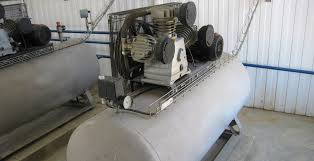Air compressors are vital equipment for both DIY and industrial applications. There are different types to choose from, varying based on several factors such as noise production. They have several uses, from filling gas cylinders for scuba diving to powering spray guns and pumping air conditioning systems.
Super silent air compressors are designed to run while generating as little sound as possible. This kind of compressor uses machine precision, lubrication, and noise insulation to achieve its desired effect. With them, you have an environmentally-friendly tool that can be used in spaces when quiet operation is preferred.
What Causes Air Compressor Noise?
Two principal factors contribute to noise generated by an air compressor: friction and floor placement. If compressor components come in contact as it operates, it will result in louder noise. Typically, the noise generation of a unit is proportional to the number of moving parts within it. Gas-powered compressors tend to be louder than their electric counterpart since their moving parts are more.
The environment where a compressor is used contributes to its noisiness. Keeping your unit on smooth concrete or in an open area can lead to sound amplification. A compressor that is close to an end-use is more likely to cause a disturbance, and moving it to a further off location is a possible solution.
How Air Compressor Noise Can be Minimised
People who need silent air compressors can easily purchase one. However, if you have a noisy one, there are ways to minimise the sound output.
- Work at a Distance from the Air Compressor
As we mentioned earlier, proximity factors into relative noise generation. One of the easiest ways to reduce this is by keeping the equipment from the workspace as far as possible. Extension hoses can come in handy to achieve this though the drawback is that hose length can reduce the air pressure derived.
- Soundproof Enclosure
This can enhance a quiet air compressor’s silence, which is typically used in homes and offices. With foaming and boarding materials, a soundproof box can be constructed and used during times of operation. A horizontal portable air compressor can be put in a 12mm medium density fibreboard that may be double-plated for a total thickness of 24 mm. Ensure that the power cord, tool hoses, and inlet valves are accounted for.
- Wrap Air Compressor in Sound Blanket
Although the soundproof enclosure is the most effective way to reduce compressor noise, sound blankets are an alternative. They minimise volume by absorbing mid to high-frequency sounds. Drape them on walls surrounding the compressor to muffle output. Sound blankets are popularly used in recording studios, and if your unit is not a super silent air compressor, they can come in handy.
Super Silent Air Compressors Have a Positive Impact on the Environment
There are ways to muffle noise from regular air compressors, but the best solution is a super silent air compressor. These machines are designed from the onset to produce noise below 60 dB and can be placed right next to workers without leading to disturbance. Instead of pistons, these use rotary screws that are much quieter since their helical structure does not result in friction.
Noise pollution is a big problem in the industrialised world. The World Health Organization says that sounds less than 70dB are not damaging to living organisms irrespective of exposure duration. Exposure to sound above 85dB for over 8 hours (a typical workday) may be hazardous. These are some of the ways which silent air compressors benefit the environment and people within them:
- Minimise Hearing Impairment
There are many mechanisms via which exposure to loud noise can result in hearing loss. Very loud noise can damage the inner ear structure and result in tinnitus (ringing in the ears). If employees experience this, their quality of life will be reduced, and their work efficiency will suffer. NIOSH estimates that $242 million is spent yearly on compensating workers for hearing loss related to their occupation.
- Avoid Other Health Consequences
Apart from being dangerous to employees’ ears, a noisy work environment can increase the risk of other health issues. A number of studies have linked workplace noise to hypertension, a serious condition that makes people susceptible to strokes, heart attack, and kidney disease. Occupational noise is also linked to disorders such as insomnia and abnormal behaviour.
- Reduce the risk of Injury and Equipment Damage
A work environment which is polluted by noise hampers the ability of employees to communicate. This situation increases the risk of self-harm and destruction of company equipment. A single missed auditory signal can be the difference between a major injury and a seamlessly completed task. Do not endanger yourself or others when you can purchase a super silent air compressor.
